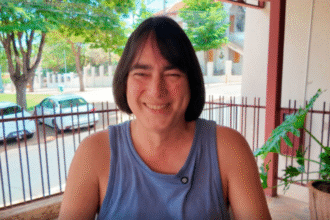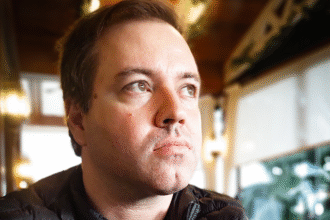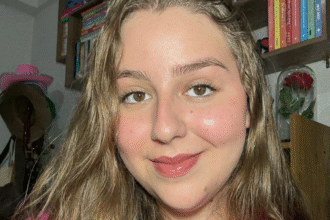Full professor at UNICAMP, Paulo S. Oliveira, known for his expertise in Ecology, expands his talent beyond academic borders by launching “O Amor Urbano”, his first book of short stories. This work reveals a creative side of someone skilled with words, but, until then, more focused on the universe of biology. Published by Telha, the book presents a collection of ten stories, set in different settings in Rio and São Paulo, which serve as perfect stages for diving into the universe of Urban Love. These tales capture people’s daily lives in the hustle and bustle of metropolises.
Meetings and disagreements take place in different locations – cafes, bars, newsstands, beaches, gafieiras, workplaces, pharmacies, building garages, gyms – shaping the characters’ lives. In these narratives, discoveries, romance, passion and intimacy are revealed, but there is also space for disagreements, betrayals, hurts and hostilities. Love and lack of love, burning desires and conflicts involve the characters, bringing to light the realities of Rio and São Paulo – highlighted by striking illustrations that enrich the reading.
The stories explore varied themes, from sexual harassment in the professional environment, bisexuality, homosexuality, racism, urban violence, domestic violence, to male and female prostitution, alcoholism, child adoption and psychotherapy. The plot passes through neighborhoods of different social classes in Rio and São Paulo, with brief visits to Miami, Toulouse, Barcelona and New York. Although they feature male and female characters, women stand out. “Urban Love” is a meeting of all that is best, worst and most unusual in encounters and disagreements in large cities.
Paulo S. Oliveira, professor of Ecology at UNICAMP, has a degree in Biology from the Federal University of Rio de Janeiro and a master’s and doctorate in Ecology from UNICAMP. With postdoctoral degrees from Harvard University (USA) and Universität Würzburg (Germany), he has already published three books on Ecology in collaboration with international researchers by Columbia University Press, University of Chicago Press and Cambridge University Press. He was president of the Association for Tropical Biology and Conservation (USA). His career in Ecology led him to live in the United States, Germany, France and Mexico, and to explore the Amazon, Pantanal, Cerrado and Atlantic Forest, always focused on studying ants. Observing people, himself and nature are his passions, as life and learning reveal themselves in these attentive looks.
How did the transition from writing about Ecology to romantic and urban stories happen? What were your main inspirations?
I think my sources of inspiration were my profession, the urban environment where I grew up, and the imagination of teenagers and adults. Added to this, I have always read Brazilian and foreign novelists, and I am very interested in our music.
As a researcher and professor in the field of Ecology, throughout my career I have developed a sense of observation of nature that involves different details of animal behavior and the relationships between them. My notes include how animals look for food, how they chase and capture their prey, how they defend themselves from enemies, where they take shelter from danger, where they look for and how they display themselves to their sexual partner, how they face rivals, how they care for their offspring.
From an early age, I developed the curiosity of observing people on the bus, in the subway, on the park bench, hugging the scooter, at the dance, in the cuddle… and then I imagined their desires, their needs, whether they seemed happy, and how they would carry on with their lives. Your lives. So I built my fantasies and invented stories in my head…
I grew up in Rio de Janeiro and, as an adult, my work allowed me to see all corners of Brazil – urban and natural. Ecology took me to live in the United States, France, Germany and Mexico – I met a lot of people, experienced different cultures, and learned from diversity. The desire to tell stories of encounters and disagreements in the urban environment grew…
The effervescence of the big city enchants me – flirtation and seduction run rampant in every corner, day and night… The fire of passion comes, joys and sadness rise to the surface, and change lives. Writing about urban love has been in my head for a long time – the moment has arrived!
“Urban Love” explores several contemporary social themes. How do these themes intertwine in the stories and what message do you hope to convey to readers?
My stories are part of people’s lives in the big city. The different themes and contexts are in the newspapers and in the media in general in our daily lives. What I did was build characters within different contexts – neighborhoods, social class, gender, cultural level, home environment, street environment, age group, profession, among others – and promote the resulting encounters and emotions.
I didn’t write the stories with the intention of transmitting messages – I just wanted to tell people’s lives, and their relationships, in the big city environment, with Rio and São Paulo as settings.
What I show in the stories are the different ways in which people deal with their emotional lives and their desires – without any value judgment on my part.
With so many different settings, including international cities such as Miami and New York, how did you choose the environments for each story and how do these locations influence the stories?
I wanted to contextualize the stories in different environments and cities – including other countries – aiming to cover situations of chance encounters that could happen to any of us; whether in our city, traveling or working abroad.
This also allowed us to create characters with different profiles. As I lived outside Brazil, I thought that scenarios and brief episodes in foreign cities would enrich the diversity of stories, contexts, and characters.
Despite covering a variety of topics, the main role is given to women. How important is this approach and how do you approach female complexity in your narratives?
I’ve always been more fascinated by female characters, and I gave women a greater role in my stories. I thought it would be cool and opportune to address – from a women’s point of view – topics such as professional success, sexual harassment at work, prostitution and love life, seduction and desire, homosexuality, racism, domestic violence and sexual abuse. These are very current themes and I felt the desire to emphasize them in my stories, giving protagonism to female characters.
I think there is a predominance of male characters in contemporary literature and media. I’m happy that my stories express the power and leadership of women in the workplace, in the community, and in their personal lives.
How has your experience as an observer of nature influenced the way you observe and interpret human interactions in the stories in “O Amor Urbano”?
My experience researching nature and writing scientific articles and books in the area of Biology/Ecology did not help me in interpreting human interactions and emotions – we learn this from life!
I can say, however, that academic experience – as a researcher, writer and teacher – helped me a lot in writing and structuring my stories, aiming for clarity and focus, to keep the reader interested.

Is there a specific story in “Urban Love” that is particularly meaningful to you? Can you share a little about her?
I’ve thought about this – all stories are equally important to me. I love the contexts I invented, the characters and the plots. Every now and then I read it again, and I enjoy it – the characters become like our children… It’s a great feeling!
How do academic and literary environments coexist in your life? How does one aspect influence the other?
The two environments complement each other harmoniously, and complete me on a personal and professional level – they help me to be a better person and improve me as a scientist, teacher and writer.
I had already written articles and books on science, and I am truly fascinated by the career I chose – I would do it all again!
However, the literary experience with Urban Love brought me new joy, ignited a new flame – the teenager who imagined love stories met the naturalist who observes nature. The balance is perfect – academic passion helps literary passion, and vice versa…
As a renowned ecologist, how do you see the connection between the environment and human stories in the urban narratives you create?
The connection I see is the following: Animals flee from danger, suffer from pain, seek pleasure. So do we!
What are your future plans in the field of writing? Can we expect more forays into the world of fiction, or are there other projects in mind?
I had to study a lot to write O Amor Urbano – I read many authors, followed guidelines on text structure, length of a story, how characters are characterized, how many characters should be highlighted, how many should have names (‘many names’ is not good ), how to describe the setting of the story, how a plot begins-develops-ends, etc.
I have plans to write a longer story and I’ve already started drafting some ideas, characterizing some characters and their professions, cities, encounters, conflicts. Now I will have to study to see how to structure a longer story – with a beginning, middle and end – in a way that captivates hearts and minds. Let’s see what this will do…
To what extent do your life and research experiences influence the diversity of characters and experiences in “O Amor Urbano”?
In many ways. From the age of 22 to 30 I traveled all over Brazil doing my research – I walked through the Amazon, Pantanal, Cerrado and Atlantic Forest. I saw beautiful and ugly things, I met ordinary people, good people and fascinating people – in the fields, in the forests, on the rivers and in the cities. With nature and with our people I have matured a lot personally and professionally.
Between the ages of 31 and 43 I repeatedly traveled abroad for conferences and spent periods of professional development in four countries – the United States, France, Germany and Mexico. These experiences were fundamental in my personal and academic development. In addition to doing research in prestigious scientific institutions, during this period I was able to live with people from different cultures, in societies with customs and values different from ours.
Today I understand that Ecology allowed me not only to get to know my country and its people, but also to put the world and its human and cultural diversity within my reach.
My worldview comes from the diversity of cultures, customs, academic manifestations, artistic manifestations, and people I met around the world. I have no doubt, Urban Love comes from all of this!
Follow Paulo S. Oliveira on Instagram





